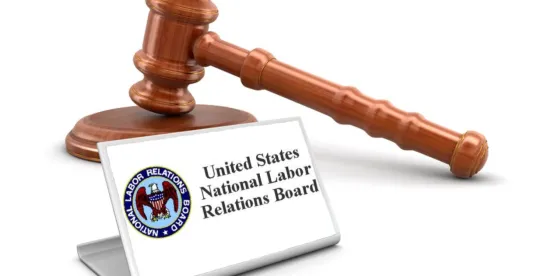As we have previously reported, from the time President Biden took office, the National Labor Relations Board (“NLRB” or the “Board”) began systematically reversing Trump-era policies, and shifting toward increasingly more pro-union and pro-employee policies. These efforts have not been slowed by the impending end of the Biden administration. On December 10, 2024, the NLRB overruled a Trump-era Board decision and returned to an employee- and union-friendly standard for determining when unilateral workplace changes made by an employer are unlawful.
In Endurance Environmental Solutions, LLC, 373 NLRB No. 141 (2024), the Board returned to its “Clear and Unmistakable Waiver” standard. Under this standard employers are required to bargain with a union about changes to mandatory subjects of bargaining unless the collective bargaining agreement expressly waives the right to bargain. This heightened standard makes it much more difficult for employers to make unilateral changes to their operations.
Background
The National Labor Relations Act (“NLRA” or the “Act”) requires employers and unions to bargain in good faith with respect to wages, hours and working conditions (mandatory bargaining subjects). The end product of that bargaining process is the parties’ collective bargaining agreement (CBA), which serves as the physical embodiment of the parties’ bargained-for deal and contains the language on which the parties have agreed. It is that language that determines each parties’ rights, duties and obligations under the CBA and, now, under the Act.
While it is well-established that an employer does not violate the Act if CBA does, in fact, grant the employer the right to take certain actions unilaterally (i.e., without further bargaining with the union), unanticipated issues and controversies often arise over whether an employer’s conduct is permitted under the CBA or not. Indeed, despite the most careful drafting, there will be times when a CBA’s language, though perhaps arguably applicable to the given situation, will not be directly on point and/or require interpretation to determine the parties’ rights and obligations under the CBA.
Before 2019, the Board used different forms of the “Clear and Unmistakable Waiver” standard for decades. Under the most recent formulation of that standard, the Board would ask and answer the question, “Does the CBA contain a provision that specifically addresses and governs this controversy?” If the answer to that question was “No,” then the Board typically concluded that the contract did not govern the controversy and the union had not clearly and unmistakably waived its statutory right to bargain over the employer’s conduct, rendering that conduct an unfair labor practice because it was a unilateral change in working conditions implemented without prior bargaining with the union.
During the first Trump administration, the NLRB issued a decision in MV Transportation, 368 NLRB No. 66 (2019) that expressly rejected that standard and adopted a “Contract Coverage” standard. As we discussed previously, under this standard, the Board asked the following question: “Viewing the alleged change in the context of the terms of the parties’ CBA, is that purported change within the ‘compass’ or ‘scope’ of the contract’s provisions that grant the employer the authority to act unilaterally?” If the answer to that question was “yes,” then the employer’s so-called change may give rise to a contract dispute requiring an interpretation of the language of the CBA by an arbitrator, but it was not considered a unilateral change requiring pre-implementation bargaining because the parties had already bargained over the issue and because the dispute was “covered” and, thus, governed by the parties’ existing CBA.
Endurance Environmental Solutions
On December 10, 2024, the Board released its decision in Endurance Environmental Solutions, which expressly overruled MV Transportation, and returned to the “Clear and Unmistakable Waiver” standard.
This case was related to a dispute about the employer’s unilateral decision to install surveillance equipment in its fleet of trucks. The employer—a waste transportation company which owns and operates 400 trucks—decided to purchase and install cameras in the entire fleet of trucks that could be used to monitor the safe operation of the trucks. Of those trucks, five or six are operated by members of the bargaining unit. The employer did not bargain with the union over the decision to install the cameras. The union filed an unfair labor practice (“ULP”) charge against the employer for refusing to bargain.
The administrative law judge agreed with the union that the employer did not provide the union with sufficient notice or the opportunity to bargain about the issue. However, the ALJ applied the “Contract Coverage” standard and found the employer did not violate the Act because the management rights clause of the CBA reserved the right to “implement changes in equipment” and thus the installation of cameras was “covered” by the contract and did not require pre-implementation bargaining.
However, upon Board review, the Democratic majority of the Board expressly rejected the “Contract Coverage” standard and overturned MV Transportation. The Board explained that in returning to the “Clear and Unmistakable Waiver” standard it “will look[] to the precise wording of relevant contract provisions.” The Board also indicated that broad management rights clauses that lack specificity will not be deemed to be a waiver. However, a waiver may still be demonstrated where it can be shown that “the specific issue was ‘fully discussed and consciously explored’ during negotiations and that ‘the union consciously yielded or clearly and unmistakably waived its interest in the matter.’”
The Board applied this revised standard and held that the management rights clause of the CBA was insufficiently specific on the installation of cameras that could be used to potentially discipline unit employees, and there was no evidence of bargaining history that suggested that the union waived bargaining on the issue. Accordingly, the Board held the employer violated the Act by failing to provide the union with notice and opportunity to bargain over the decision.
Of some note, the Board applied the decision retroactively to the specific case in Endurance Environmental Solutions, but it did not determine if the new standard would be applied retroactively for all cases pending.
Key Takeaways
With its decision in Endurance Environmental Solutions, the Board continued its efforts to push the pro-employee and pro-union agenda that has become a hallmark of President Biden’s term in office.
With the return to the “Clear and Unmistakable Waiver” standard, employers should carefully examine the language of any applicable CBA’s before taking any unilateral actions related to mandatory subjects of bargaining. Where a CBA does not include express language that waives the union’s right to bargain over these subjects, employers are cautioned that taking such an action could result in the union filing a ULP charge for those actions.
While this decision presents challenges for employers, it may be short-lived. It is expected that the newly-constituted Trump administration Board will move quickly to implement a pro-business agenda, and work to reverse many of the Biden administration’s key policies.
Typically, it takes time for a new president to substantially alter the composition of the Board. However, only one day after issuing this decision, the Senate failed to confirm current NLRB Chairman Lauren McFerran to another term. Unless the Senate moves to confirm that nomination in the few remaining days of its current session her term will end on December 16, 2024, and President-elect Trump will enter office with two vacancies to fill on the five-member Board, quickly securing a Republican majority on the five-member Board. Which means that the decision in Endurance Environmental Solutions may be a fleeting last gasp for the current Democratic majority of the Board.






 />i
/>i
